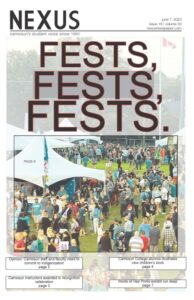Not enough staff and faculty at Camosun are committed to Indigenization. Indigenization workshops to make classrooms and courses safer for Indigenous students are strictly voluntary, so staff have no incentive to take opportunities to deconstruct their biases and improve their classes. And it’s needed: both of us have either witnessed or been subject to anti-Indigenous comments made by faculty members during classes.
There is also no mandatory hiring percentage for Indigenous staff (there is a percentage of space held for Indigenous students in some, but not all, Indigenous programs). This lack of representation is an issue for a number of reasons, one being that Indigenous students will not feel culturally supported by their instructors.
In the classroom and on campus, it’s a common experience to not hear the term “Indigenous” being used to describe anything or anyone who is Indigenous. The issue of language is a large one considering it is very triggering to constantly hear terms like “native,” “Aboriginal,” and “native American” being used interchangeably with “Indigenous.”

Even a basic tool such as the college library cataloging system has not removed the use of the word “Indian” when referring to Indigenous literature. All I wanted was to check out a Billy-Ray Belcourt book, and I had to take a deep breath and move on when I saw it categorized under “Indians — Poetry.”
One simple action that the college could reinforce is territorial acknowledgements. There’s always one posted on an instructor’s D2L, but more often than not, it will be stated once that we’re on unceded territory and then not mentioned for the rest of the semester. Having territorial acknowledgements before every single class would be a good daily reminder of the respect that we should have for the peoples whose stolen land we’re learning on.
Camosun College is all about Indigenization, so it needs to follow that through with definitive action. Even if it was a small amount, like five percent, having a minimum hiring policy for Camosun would be extremely helpful in creating an environment where Indigenous peoples are respected in the student population and among leadership positions.
Every step is important, even if it’s small. Ensuring that instructors are actually implementing territorial acknowledgments consistently would be a step in the right direction.
What we’re asking for isn’t unreasonable. We just want to be able to show up to class knowing that we won’t have to deal with these recurring issues. We want to be able to go to the library without seeing that Indigenous people are still being referred to as “Indians” in an educational setting. It’s just unbelievable to me that we have to fight to update the language used in the Camosun library cataloguing system.
Individuals educating themselves is a necessary step towards reconciliation. Not all instructors will take a voluntary Indigenous course on how to be respectful. So, it’s time to make that mandatory. That way, even if they don’t agree with what’s being taught, they must attend and make some effort toward a more comfortable classroom for Indigenous students.
Camosun embraces Indigenization in name, but needs to take definitive action in policy that will nurture an environment where Indigenous peoples and students are respected for more than tokenization and a smiling face on brochures.
